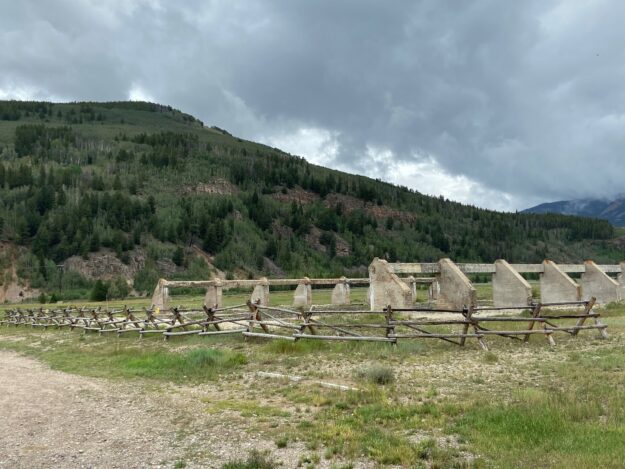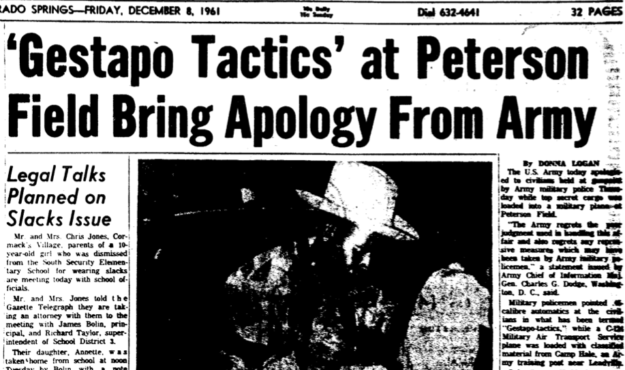Widgetized Section
Go to Admin » Appearance » Widgets » and move Gabfire Widget: Social into that MastheadOverlay zone
As politicians seek protections, Camp Hale history extends beyond 10th Mountain Division to POWs, CIA

Colorado lawmakers Senators Michael Bennet (D-CO) and John Hickenlooper (D-CO), Governor Jared Polis, and U.S. Rep. Joe Neguse (D-CO) sent a letter to President Joe Biden yesterday urging him to use the Antiquities Act and other presidential authorities to protect Colorado’s Camp Hale and the Tenmile Range as the Camp Hale-Continental Divide National Monument.
“We appreciate Secretary [of Agriculture Tom] Vilsack’s recent visit to Colorado to see Camp Hale. Based on the overwhelming support expressed at the meeting from local elected leaders, conservation stakeholders, sportsmen, ranchers, business leaders, veterans and the 10th Mountain Division Foundation it is clear that Coloradans across the state support the conservation and preservation of these landscapes for future generations,” wrote Bennet, Hickenlooper, Polis, and Neguse in the letter. “We strongly urge you to use your Presidential authorities to swiftly protect Colorado’s public lands within the CORE Act.”
The area would be protected under Bennet’s proposed CORE Act, which seeks to protect over 400,000 acres of public land in Colorado, establish new wilderness areas, and safeguard existing outdoor recreation opportunities to boost Colorado’s economy. The bill has passed in the U.S. House of Representatives, but has stalled in the Senate, just like legislation seeking to codify protection protections for abortion and LGBTQ rights. Both Bennet and Hickenlooperoppose abolishing the filibuster.
Jennifer Rokala, executive director of the Center for Western Priorities, also urged President Biden to take action to preserve the historic region. “This is an excellent opportunity for President Biden to use his authority to protect public lands at the invitation of state lawmakers and community stakeholders who have worked tirelessly to put together a responsible conservation plan for Colorado,” she said in a news release. “The CORE Act has strong public support among Coloradans, where residents see the value in conserving public lands for future generations. Almost 90% of Colorado voters said they support protections proposed in the CORE Act in recent polling conducted by the Center for Western Priorities. Despite strong public support, the CORE Act has been held up in the Senate by lawmakers who are dead set against passing any conservation legislation. It’s time for President Biden to step in to deliver for the people of Colorado.”
The letter specifically notes the historical significance of Camp Hale. “The history of this area, including the role that it played in preparing the 10th Mountain Division for some of the most difficult moments of World War II, makes it the ideal candidate for a national monument designation,” wrote the lawmakers. “Many of the veterans of the 10th Mountain Division returned to Colorado after the war to establish our state’s outdoor recreation economy by starting the ski areas that Colorado is known for, further establishing the role Camp Hale and its veterans have played for our state and nation.“
The U.S. Army built Camp Hale in 1942 to train soldiers of the 10th Mountain Division in Alpine warfare. The soldiers of the 10th Mountain Division would go on to fight in Italy’s Apennine Mountains during World War II, and 10th Mountain veteran Pete Seibert would go on to found Vail in 1962.
While much of Camp Hale’s renown is associated with the 10th Mountain Division, Camp Hale was also home to Nazi POWs and a punishment unit composed of draftees with fascist sympathies and resident aliens with Italian or German heritage who were deemed too much of a security risk to take part in the war. One of the soldiers assigned to the punishment unit, Dale Maple, went AWOL from Camp Hale in 1943 with two Nazi POWs in an attempt to defect to Germany by way of Mexico and South America. Maple was captured in Mexico and his subsequent trial become one of the most famous domestic treason cases of World War II. Colorado author Bill Sonn documented the case in his book Something Like Treason.

After World War II, Camp Hale was utilized by the CIA to train Tibetan guerillas to resist China’s occupation of Tibet from 1957 to 1964. Camp Hale’s elevation and remote location made it an ideal training ground for the volunteer army that would operate in the Himalayas. To keep people away, the CIA used the cover story that Camp Hale was being used for atomic testing. Despite the attempts at secrecy, the endeavor was almost exposed in December, 1961, after a team of military policemen held civilians at Peterson Field (now Peterson Space Force Base and the Colorado Springs Airport) at gunpoint to allow a busload of the Tibetans to load into a waiting C-130 without being seen. The incident was reported by the Colorado Springs Gazette Telegraph, who decried the “gestapo tactics” used by the military.
“It was a case of bad judgment, but we were involved in a very sensitive project. Corrective action has already been taken,” said Brigadier General A. H. Manhart in a statement to the Colorado Springs Gazette Telegraph. “It was a matter involving national security, and the actions were in the national interest. On behalf of the U.S. government, an apology is tendered to those who were inconvenienced.”
Ultimately the CIA’s efforts at training a rebel army at Camp Hale were unsuccessful, and in June 1965, the Department of the Army officially closed Camp Hale and transferred the land to the White River National Forest.
Editor’s note: This story first appeared in the Colorado Times Recorder.
Heidi Beedle
Latest posts by Heidi Beedle (see all)
- Colorado protects abortion rights but reproductive health care still faces threat from Trump, SCOTUS - November 7, 2024
- ‘America’s Mom’ says Boebert knew all about Peters’ voting machine breach - October 14, 2024
- Hickenlooper, Bennet lead charge to codify right to contraception as Republicans balk - June 7, 2024


